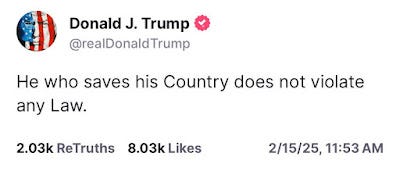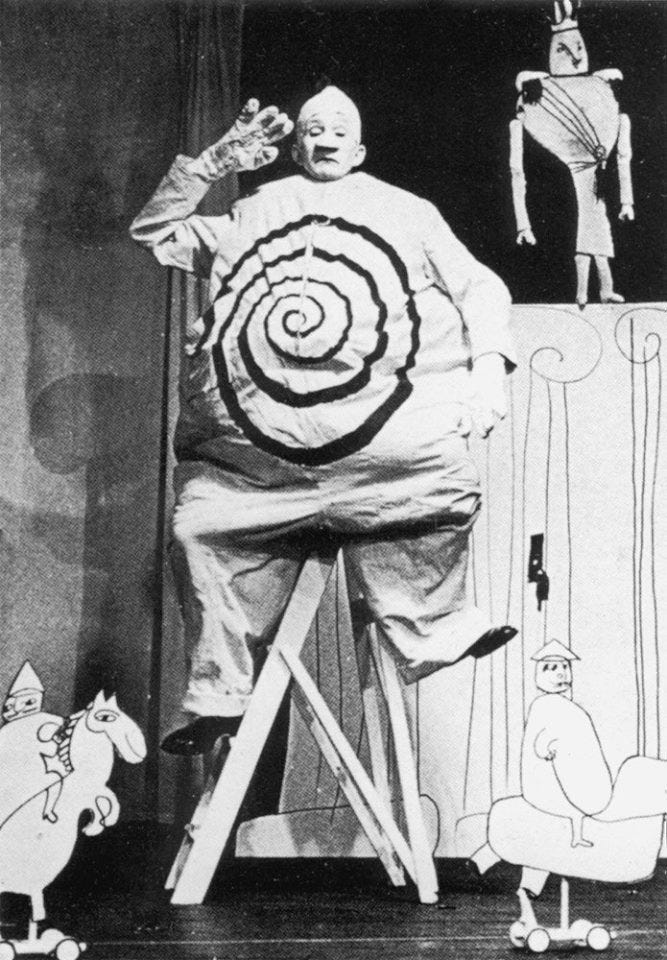I guess that should be counted as a kind of confession, with a plea for jury nullification: yes, when you come down to it, he kind of has tried to overthrow the US government, a couple or three times, and that's probably illegal in the normal way of things, but then the price of eggs is really high, so what choice did he have? You can't make a revolution omelette without breaking some constitutional eggshells, even if that's going to push the egg price even higher.
That is, Trump is really and truly making the claim that he has led a revolution against unbearable oppression, and at a time like this, the ordinary laws that we've been living with don't apply any more. Laws specifying procedures you have to follow if you want to fire a few hundred civil servants, or saying you have to spend the money Congress has allocated for a certain purpose on that purpose, or demanding that you treat immigrants as if they were human beings. You're busy saving your capital-C Country, for Christ's sake! Like the Founders, who were breaking the law too!
Though Jefferson wrote his complex and sophisticated argument denying that they were doing that at all, putting all the blame on poor George III and claiming not that the revolutionary gang were the saviors of a Country which didn't in any case exist yet—just that they were breaking up with the abusive old country, and that they were acting in the service of self-evident truths, a higher kind of law that George was alleged to have relentlessly violated, including the unwritten British constitution, particularly in his refusal to grant them the traditional liberties of the British citizen with respect to representation in Parliament.
The quote itself is usually attributed to Napoléon Bonaparte, as a presumptive defense for his role in the coup d'état of 18 Brumaire (November 9) 1799, which overthrew the government of France under the five-man revolutionary Directoire, and established him as First Consul, though it wouldn't have made much sense for Bonaparte to say it either; he undoubtedly thought of himself as the savior of the nation, but preferred to have other people say that for him (unlike the irrepressible Donald Trump), and was anxious that the thing look backed by stringent legality): "The extraordinary decree of the Council of Ancients, in conformity with articles 102 and 103 of the Constitution, has put me in charge of the city [of Paris] and the army," he told the soldiers gathered at the Tuileries, after the Council finished its vote before high-tailing it out of town to Saint-Cloud; "I have accepted, in order to support the measures it will be taking, all on behalf of the people."
The French emperor was certainly a murderous and narcissistic psychopath, but he wasn’t an idiotic meme like our American emperor. He had some sense of dignity, and some sense of what ordinary people are like and what they need to hear.
Imagine Vought or Miller writing Trump a speech offering a legal justification from the Constitution or statutes for firing 12 or 17 inspectors general (we still don't know exactly how many) or decreeing the end of birthright citizenship, or sending the military in contravention of the Posse Comitatus Act to pacify the southern border area. Of course they wouldn’t be able to do it, any more than they are able to write up the administration’s executive orders and memoranda with the minimal professionalism required to keep judges from grinding their teeth in rage or laughing in the administration’s faces.
In fact Napoleon didn't say it, as I've been able to determine with my advanced Googling skills. The first appearance of the sentence "Celui qui sauve sa patrie ne viole aucune loi" is in 1838, 17 years after Napoléon's death on St. Helena, in a little collection of 525 unsourced sentences attributed to the emperor under the title Maximes et Pensées de Napoléon, signed by a hatmaker called Jean-Louis Gaudy, but actually written by no less a figure than Honoré de Balzac, it turns out, who ghostwrote it on commission from Gaudy, making the quotes up mostly up out of his head (Gaudy was apparently hoping to earn a decoration from King Louis-Philippe, the "citizen king" crowned after the 1830 revolution, who encouraged the Napoléon cult to bolster his liberal bona fides—Balzac himself was a Legitimist supporter of a Bourbon restoration but also a great admirer of Napoléon and his contrast with the destestable bourgeois dominance of the age of Louis-Philippe, which shows how confused French political thinking was in the early 19th century). Balzac could never afford to turn down some easy money. He probably tossed it off in three days with 60 cups of coffee and then hurried back to whichever installment of La Comédie Humaine he was working on.
That makes the thing a neat little epitome of what this Trump administration is about. We can argue what he means by using the saying, we can debate where he got it from (the prevailing opinion on X and Threads seems to be that it's Stephen Miller, who loyally retweeted its appearances three times yesterday afternoon), but what stands out in the end is that it's fundamentally bogus, like everything else they do.
We are being ruled by memes, meme stocks, meme coins, meme policies, meme slogans, meme philosophies of government, a meme emperor who thinks he's Napoléon when he's actually more like Père Ubu, and his Batman villain billionaire sidekick. And we do have to worry about what it portends for the administration as a whole in the awful future, because it's actually going to kill people, throw families into turmoil, halt important research, destroy international relationships, spread poverty, crash markets, encourage criminal corruption, weaken the military, harm the education system, and generally humiliate our country in the eyes of the world, but we can't let them continue to make us stupider. Refusing to become stupider is our only hope.
From Michael Meschke's production of Alfred Jarry's Ubu Roi, Stockholm 1964.






I hope someone is able to do a deep dive into the Adventures of DOGE from the lasr few weeks. The head of a Commission (and what regulations or laws define the makeup, scope, and authority of a Comission, and if relevant was any of that done?) and a group of civilian programmers violated a host of policies and procedures, and likely a handful of laws to take control of many critical systems and related databaases. And no visible pushback of any kind. Who was supposed to enforce those policies and procedures, and did they simply aquiesce or under orders?
And the layoffs. Other than a direct Presidential order, Musk has no authority to fire or lay anyone off. Were those orders given, or did people just go home after the programmers locked them out?
I guess I'd like to know what regulations and laws were ignored and why it was so easy to ignore them. Was it really as simple as the magic phrase "because the President says so"? I get that Democrats think voters don't care about abstract problems like foreign aid and databases, and they're not wrong, but the total collapse of the Executive branch by and idiot and a bunch of hackers is going to be a huge problem.
"The French emperor was certainly a murderous and narcissistic psychopath..."
Being despotic and egotistical pretty much comes with the territory for any conqueror (or would-be conqueror), but I think "narcissistic psychopath" might go too far. He seems to me the least psychopathic of his fellows (Alexander, Caesar, Temujin, Hitler...) and the one who actually did the most good during his reign. Certainly he was Good For The Jews, which (at least in my family's considered judgment) was the most important thing.